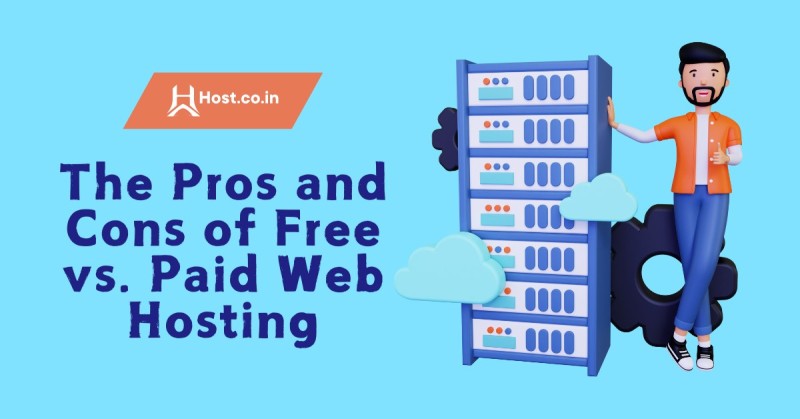It might be difficult for new website owners to sort down the numerous web hosting providers. The first hurdle usually involves choosing which web hosting provider to use—free or paid. While it goes without saying that everyone wants the best deal, seeking for the lowest price may lead to unethical providers or even frauds that compromise your data.
So, how do you choose a reliable web host? What are the main differences between paid and free web hosting, other than the clear financial difference? A detailed discussion of each category's key features, in addition to its advantages and disadvantages, will enable you to select the option that best suits your requirements.
What is Free Hosting?
Free hosting is an economical choice for startups, small businesses, and personal bloggers because it offers free web domains and hosting. But it has downsides as well, like limited bandwidth, traffic capacity, and the host's branding showing in the URL. It works well for building easy, shared websites, such as professional portfolios.
What is Paid Hosting?
Paid hosting involves paying for web hosting services; shared, cloud, Self Managed VPS Plans, managed, dedicated, and WordPress hosting are just a few of the plans provided. As it allows you to host multiple sites on a single server and offers resource control, security, and reliable performance, shared hosting can be the best option for beginners.
Pros & Cons of Free Web Hosting:
Pros :
- Free of Charge: Free hosting is ideal for people on limited funding because it allows you to experiment with website layout and administration without having to spend any money.
- Beginner-Friendly: Free platforms usually come with user-friendly website builders and templates that let you easily and quickly launch your website—even if you don't know how to code.
- Ideal Beginning Point: For individuals experimenting with website building or starting a personal blog, free hosting is the ideal place to start. It allows you to take a first step into premium hosting.
- Quick Setup: The simplified setup procedure of free hosting allows you to quickly launch your website and focus on content and design rather than technical issues.
Cons:
- The subdomain issue: Your website will likely be hosted on a subdomain such as "yourwebsite.example.com," which will make it look less official than an individually tailored domain such as "yourwebsite.com."
- Customization Restrictions: Free platforms can put limitations on function and design options, making it more difficult to develop an appealing website.
- Unwanted Ads: In the hope to make money, free hosting companies frequently place distracting ads on your website, which can drive away users and harm the image of your business.
- Resource Restriction: As free plans usually have an inadequate amount of storage, bandwidth, and processing capacity, they might cause slower loading times, frequent failures, and restrictions on the growth of content.
- Scalability Issues: If your website grows in popularity, it can exceed the features of free hosting, forcing a costly shift to a paid plan.
- Restricted Access: You might not get advanced features, databases, or server-side scripting—all of which are necessary for advanced websites—and you won't have much control over the server's settings.
Pros & Cons of Paid Web Hosting:
Pros:
- Reliability: Well-maintained servers with higher stability and uptime—up to 99.99% at times are provided by paid hosting.
- Customer service: Skilled professionals provide 24/7 support for paid programs, ensuring immediate help.
- Exclusive Branding: When you pay for hosting, you may keep your website free of host commercials, have a fully-owned domain name, and use just your branding.
- Room to Grow: When your website grows, paid hosting can handle more visitors, more pages, and simple updates.
- Security: Unlike free hosting choices, paid companies make investment in advanced security measures to protect against breaches.
- Features that are beneficial - Paid web hosting plans come with a number of features that are helpful, like social media sharing options, SEO tools, e-commerce facilities, automatic backups, analytics for websites, and security updates.
Cons:
- Unexpected hikes: Lower-tier paid hosting often face unexpected pricing hikes that damage the image of the business and weaken trust among customers.
- Absence of Free items: Poor quality paid hosting might charge additional fees for items that come included with higher-end plans.
- Poor Technical help: A few premium hosting providers offer poor technical help with 24- to 48-hour turnaround times.
- Few Add-Ons: Paid hosting frequently delays the inclusion of new or upcoming add-on services.
- Pay for Add-Ons: Even though many services in paid hosting are used frequently, they often come with additional fees.
- Restricted Free Space: Only a limited amount of free space is offered by paid hosting; additional space is extra expensive to obtain.
Conclusion:
Given its low cost, free website hosting may appear appealing, but it frequently proves unsatisfying for long-term business growth. It usually provides weak security, poor performance, and limited resources, all of which could affect the reliability and development of your website. Paid hosting services, on the other hand, offer more control, performance, and uptime. These advantages allow higher search engine ranks, boost security, and improve the speed and stability of your website. As a result, this helps in attracting in and retaining more clients.
The most suitable option is going to depend on your website's objectives, room for growth, and budgetary limitations. Make an informed choice by considering your needs and the pros and cons of both premium and free web hosting. Furthermore, we strongly advise you to look into our performance-driven and safe shared Hosting plans, self managed VPS plans if you're looking for a paid web hosting solution and a reputable web hosting provider.
